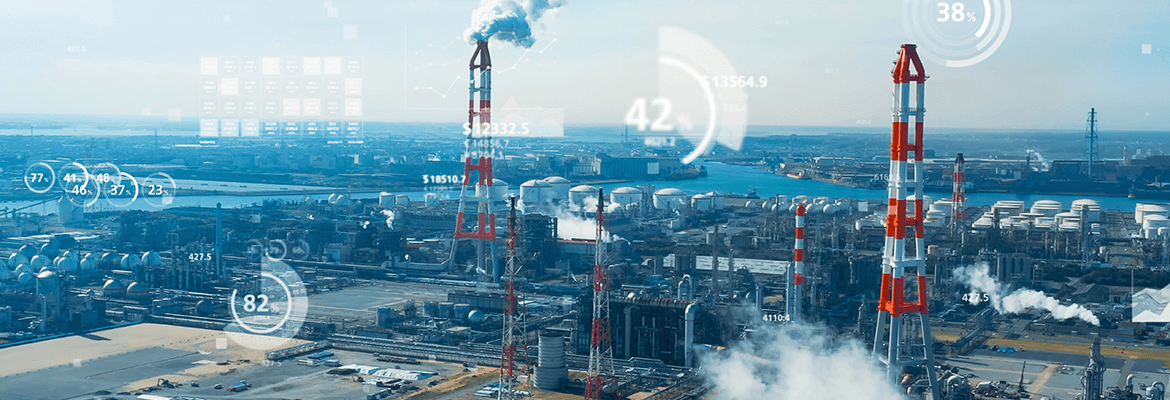Optimize SAP Data Analysis for a Sustainable Future

Monitoring your carbon footprint aligns your company with global efforts to address climate change and serves as a cornerstone of responsible corporate governance and cutting-edge sustainable business practices. Understanding your SAP data to its fullest is the first step on the journey towards a more sustainable future. With an advanced operational reporting solution that delivers proper data analysis, you can put your best foot forward.
Top Reasons for a Heavy Carbon Footprint From Your Supply Chain
Keeping supply chains operating seamlessly in geopolitical and economic uncertainty is not a new challenge for global manufacturers, though it may feel like supply chain turbulence has become the new normal. Your supply chains are under constant pressure, and this can make it hard to drive efficiencies that meaningfully impact your carbon footprint. These are four stressors on supply chain sustainability:
- Emissions-heavy transportation: Using planes and long-haul trucking for transportation are the high-energy culprits of high carbon emissions. Total dependence on fossil fuels.
- Improper load optimization: Often caused by inefficient planning and inadequate utilization of cargo space, leading to poor transportation efficiency such as half-full containers.
- High material consumption: When the use of raw materials produces too much scrap and waste, often the result of inefficient processes, overproduction, and inadequate resource management.
- Distant supplier network: Obtaining your goods and materials from suppliers who are far away from your manufacturing sites.
Your SAP system holds the key to both understanding and reducing your carbon footprint. Yet, inaccurate reporting due to unreliable or outdated data within SAP can paint a misleading picture. Flawed calculations can underestimate or overestimate emissions, obscuring your true environmental impact. Additionally, inefficient dashboards and analytics hinder visibility into resource consumption patterns, making it difficult to pinpoint energy-intensive processes and implement resource-efficient measures. These blind spots ultimately lead to higher emissions and missed opportunities for environmental sustainability.
To overcome these roadblocks and unlock the full potential of SAP data, manufacturers are turning to advanced technologies and emerging trends like ESG. These solutions are becoming increasingly valuable for supply chain leaders who rely on SAP ERPs to navigate the complexities of sustainable operations. Sustainability has become more best practice than trend, with over 80% of executives agreeing that businesses should make greater efforts to protect the environment. Powerful technology plays a key role in these efforts, as insight-enabled supply chain management allows early adopters to improve logistics costs by 15%, compared with slower-moving competitors.
Drive the Road to Sustainability With Better SAP Data Insights
In today’s climate-conscious market, ignoring your SAP data’s sustainability potential is a competitive misstep. Consumers and investors alike are prioritizing eco-friendly practices, and those who leverage data for impactful change will win market share and loyalty.
- Unmask hidden inefficiencies: Analyze energy consumption patterns across operations to pinpoint costly carbon culprits. Identify outdated equipment, wasteful processes, and inefficient transportation routes.
- Optimize for a greener future: Leverage insights to implement resource-saving technologies, optimize logistics, and source from sustainable suppliers. Every efficiency tweak translates to a smaller carbon footprint and a bigger bottom line.
- Empower your teams with actionable dashboards: Equip them with a real-time emissions tracking system that sets clear benchmarks and targets. Monitor progress, celebrate wins, and course-correct as needed.
Functionally, here’s what the right SAP reporting tool can delivers for your carbon footprint efforts:
- Cradle-to-gate footprint calculations: Analyze your sustainability footprint with processes that consider materials, transportation, and production.
- Data insights that drive business processes: Reduce your carbon emissions with operational reporting software that supports advanced analytics, flexibility, and understanding across your organization through analytical insights from footprint data.
- Integration for accurate calculations: Pull in data from ECC and SAP S/4HANA to calculate your footprint across all end-to-end processes.
By adopting the right SAP reporting solution, you can significantly reduce transportation-related emissions, optimize material usage, and contribute to a more sustainable and efficient supply chain. Your company receives all these benefits from insightsoftware’s operational reporting solution, Angles Enterprise for SAP.
Angles Enterprise for SAP Flyover Demo
Download NowAngles for SAP Will Future-Proof Your Business
Angles for SAP provides multinational organizations with complex supply chains the necessary tools to cleanse their SAP data, find pollution, and address bottlenecks. With advanced data analytics from Angles, organizations can prepare their data and supply chains for the future, including the vital task of reducing carbon emissions.
Angles for SAP applies a context-rich data model to your SAP data (both ECC and S/4HANA) to collect and prepare data in a user-friendly format that is suitable for reporting, even for non-technical users.
Uncover hidden inefficiencies and optimize your supply chain for sustainability with Angles. This powerful tool goes beyond basic visualizations, diving deep into your SAP ECC or S/4HANA data. Track every aspect of material flow, from raw materials to finished products, across internal and external operations. Angles analyzes every data point – origin, transportation, energy usage – to reveal inefficiencies impacting your carbon footprint and resource consumption. Empower your teams to make data-driven decisions, reduce environmental impact, and build a leaner, greener supply chain.
With Angles, your supply chain future is in safe hands. With complete SAP data oversight your operations team will enjoy:
- Reduced Transportation Distances:
- Between sourcing and manufacturing
- Between manufacturing and warehousing
- Between warehousing and customers (B2B and B2C)
- Energy-Efficient Transportation Modes:
- Opt for alternative modes (rail/ship instead of truck/plane)
- Introduce energy-efficient practices within the transportation fleet used, such as regular maintenance to optimize fuel efficiency
- Adopt route optimization technologies and explore alternative fuels to reduce environmental impact.
- Boost to Load Optimization
- Implement load optimization strategies to increase container utilization by determining the most efficient way to pack goods within a shipping container
- Reduce the number of shipments required and maximize the use of available space, leading to cost savings and a more environmentally sustainable transportation process.
- Minimized Material Consumption:
- Optimize consumption of raw materials
- Implement measures to reduce scrap
- Minimize waste generation
- Utilization of Near Sourcing:
- Switch to suppliers with manufacturing locations closer by
- Diversify supplier base to increase regional collaboration
Want to know more? Check out our white paper on Angles for SAP to see if it is the right tool for your operational reporting.




